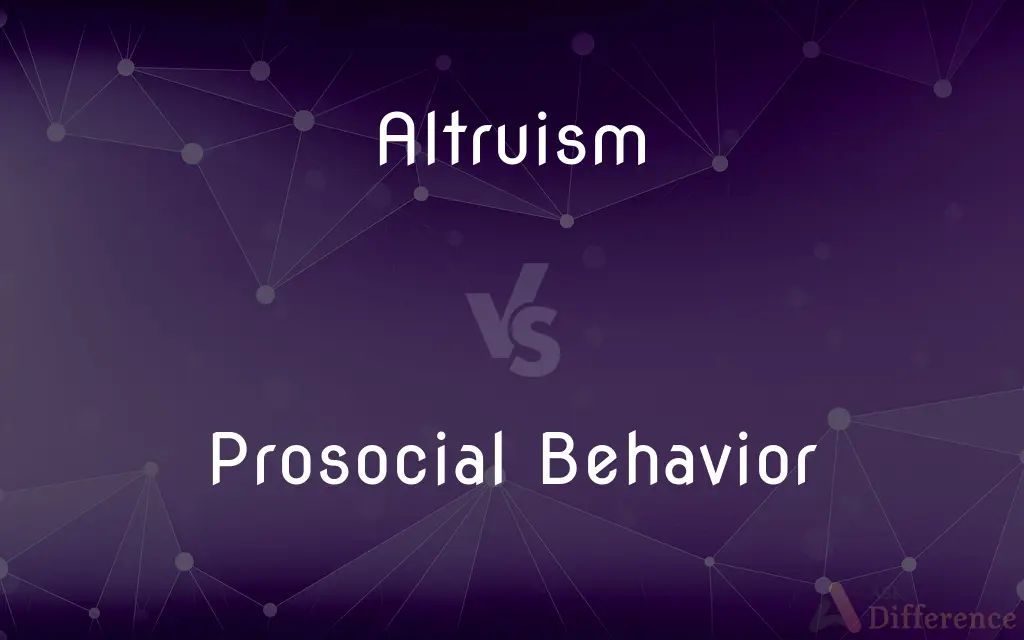Altruism vs. Prosocial Behavior — What's the Difference?
By Tayyaba Rehman — Published on January 10, 2024
Altruism is selfless concern for others' welfare, even at a cost to oneself, while Prosocial Behavior encompasses any action that benefits others, regardless of motive.

Difference Between Altruism and Prosocial Behavior
Table of Contents
ADVERTISEMENT
Key Differences
Altruism is a term that denotes a genuine, selfless concern for the well-being of others. It's an innate or learned disposition that makes individuals act in ways that prioritize others' welfare, even if it means personal sacrifice. On the other hand, Prosocial Behavior is a broader concept that covers any action intended to help or benefit another individual or group, irrespective of the motive behind the action.
Prosocial Behavior can be driven by various motivations. For instance, someone might help another due to social pressure, desire for recognition, or even to feel good about oneself. Altruism, in contrast, specifically refers to actions taken out of genuine concern for another, without any expectation of personal gain or even recognition.
While all altruistic acts can be categorized as Prosocial Behavior, not all Prosocial Behaviors are necessarily altruistic. For example, donating anonymously to a charity can be considered altruistic, as the donor does not expect anything in return. However, if someone helps a neighbor move furniture in hopes of getting a favor in return, this is Prosocial Behavior but not altruism.
Altruism often requires a deeper level of empathy and compassion. It's about understanding and feeling the pain or need of another and then acting to alleviate it. Prosocial Behavior, while beneficial, can be driven by a multitude of factors, including societal norms, reciprocity, or personal satisfaction.
In summary, while both Altruism and Prosocial Behavior revolve around actions benefiting others, their underlying motives can differ. Altruism is inherently selfless, while Prosocial Behavior can stem from both selfless and selfish motivations.
ADVERTISEMENT
Comparison Chart
Definition
Selfless concern for others' welfare
Any action benefiting others
Motivation
Inherently selfless
Can be selfless or selfish
Recognition/Reciprocity
No expectation of recognition or return
Can be done for recognition or future favors
Scope
Narrower, specific to selfless acts
Broader, includes all helpful actions
Driven By
Empathy and compassion
Various factors including norms, reciprocity, etc.
Compare with Definitions
Altruism
The act of selflessly helping others without expecting any returns.
Her donation to the unknown stranger showcased pure altruism.
Prosocial Behavior
Any action intended to help or benefit another.
Holding the door open for someone is a simple prosocial behavior.
Altruism
Prioritizing the welfare of others even at a personal cost.
He showcased altruism by sharing his lunch with the hungry child.
Prosocial Behavior
Behavior that promotes positivity and well-being in society.
Cleaning up the park is a form of prosocial behavior benefiting everyone.
Altruism
Innate or learned disposition to promote others' well-being.
His constant care for animals in need is a sign of his altruism.
Prosocial Behavior
Encompasses both selfless and selfish acts of assistance.
Helping peers with homework, expecting help in return, is prosocial behavior.
Altruism
Behavior driven purely by empathy and compassion.
Offering a warm place for the homeless during winters is an act of altruism.
Prosocial Behavior
Actions that can be driven by various motivations.
Donating to charity publicly for recognition is still prosocial behavior.
Altruism
Unselfish concern for the welfare of others; selflessness.
Prosocial Behavior
Often shaped by societal norms, reciprocity, or personal satisfaction.
Giving gifts during holidays is a societal norm and prosocial behavior.
Altruism
(Zoology) Instinctive behavior that is detrimental to the individual but favors the survival or spread of that individual's genes, as by benefiting its relatives.
Altruism
Regard for others, both natural and moral without regard for oneself; devotion to the interests of others; brotherly kindness.
Altruism
Action or behaviour that benefits another or others at some cost to the performer.
Altruism
Regard for others, both natural and moral; devotion to the interests of others; brotherly kindness; - opposed to egoism or selfishness.
Altruism
The quality of unselfish concern for the welfare of others
Altruism
Actions void of any ulterior motive or self-gain.
Volunteering in remote areas, she practiced altruism at its finest.
Common Curiosities
Is donating anonymously always an act of altruism?
While anonymous donations can be altruistic, the true measure is the donor's genuine, selfless intention.
What is the primary characteristic of altruism?
Altruism is characterized by selfless concern for others' welfare without expecting returns.
Do societal norms influence prosocial behavior?
Yes, societal norms can significantly shape and encourage prosocial behaviors.
Are all altruistic acts also prosocial?
Yes, all altruistic acts are prosocial, but not all prosocial acts are altruistic.
Can prosocial behavior be driven by selfish motives?
Yes, prosocial behavior can be driven by various motives, both selfish and selfless.
Why might someone exhibit altruism?
Individuals might exhibit altruism due to empathy, compassion, or an innate disposition to help others.
How does prosocial behavior differ from altruism?
Prosocial behavior includes any action benefiting others, regardless of the underlying motive.
Can an act be considered prosocial if expecting something in return?
Yes, prosocial behavior can involve actions done with the expectation of reciprocity.
Which behavior, altruism or prosocial, is broader in scope?
Prosocial behavior has a broader scope, encompassing all actions that benefit others.
Do cultural differences influence altruism and prosocial behavior?
Yes, cultural norms and values can influence the expression and understanding of both behaviors.
Is altruism unique to humans?
No, altruistic behaviors have been observed in various animal species as well.
Do both altruism and prosocial behavior contribute to societal well-being?
Yes, both behaviors play a role in fostering positive interactions and well-being in society.
Can societal recognition be a motive for prosocial behavior?
Yes, the desire for societal recognition can motivate prosocial actions.
Is volunteering always an act of altruism?
Not necessarily. Volunteering can be altruistic, but the true motive determines its classification.
How does empathy relate to altruism?
Empathy, the ability to understand and share others' feelings, often drives altruistic actions.
Share Your Discovery

Previous Comparison
Thoroughly vs. Truly
Next Comparison
Stop-and-Wait Protocol vs. Sliding Window ProtocolAuthor Spotlight
Written by
Tayyaba RehmanTayyaba Rehman is a distinguished writer, currently serving as a primary contributor to askdifference.com. As a researcher in semantics and etymology, Tayyaba's passion for the complexity of languages and their distinctions has found a perfect home on the platform. Tayyaba delves into the intricacies of language, distinguishing between commonly confused words and phrases, thereby providing clarity for readers worldwide.












































